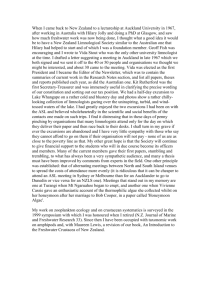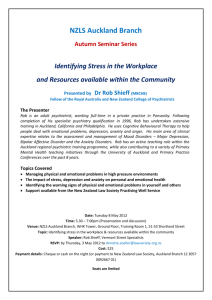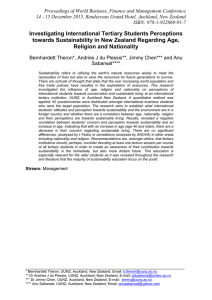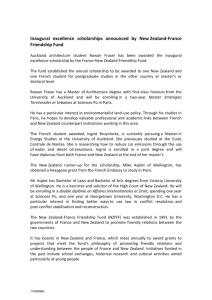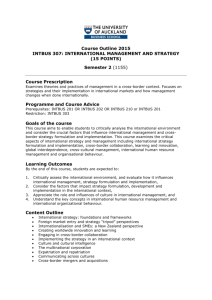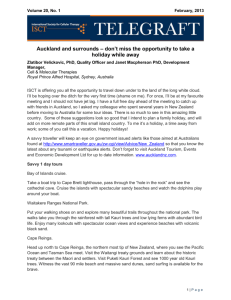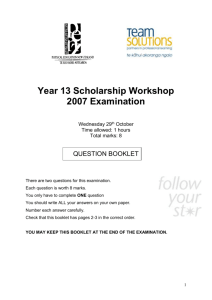editorial - University of Auckland
advertisement
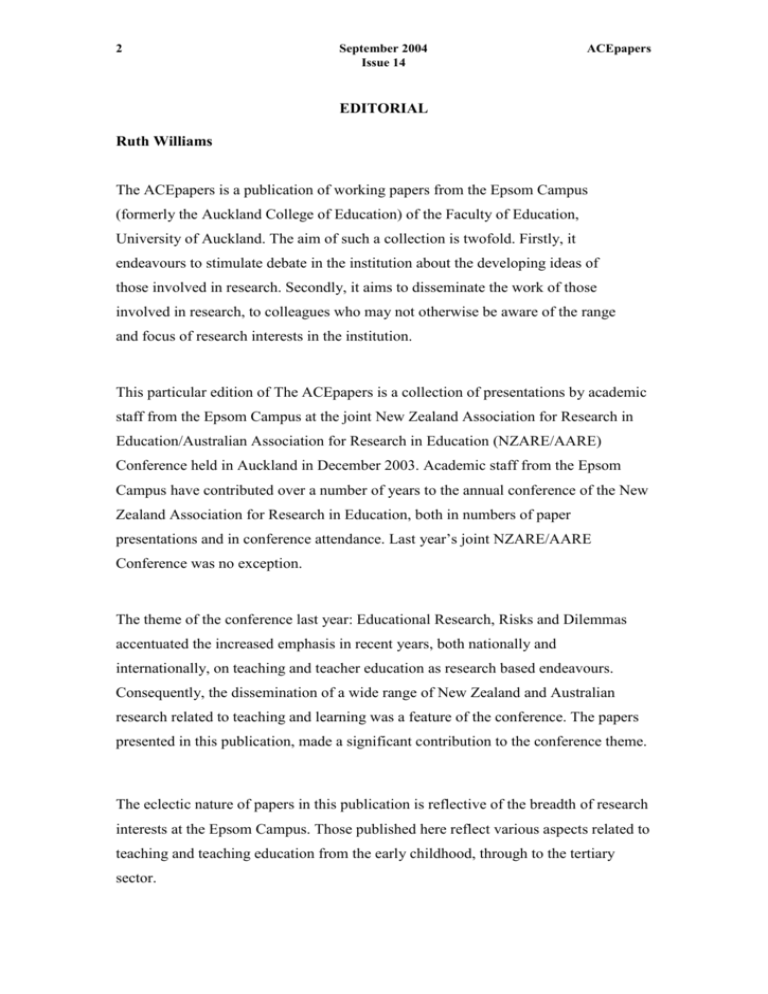
2 September 2004 Issue 14 ACEpapers EDITORIAL Ruth Williams The ACEpapers is a publication of working papers from the Epsom Campus (formerly the Auckland College of Education) of the Faculty of Education, University of Auckland. The aim of such a collection is twofold. Firstly, it endeavours to stimulate debate in the institution about the developing ideas of those involved in research. Secondly, it aims to disseminate the work of those involved in research, to colleagues who may not otherwise be aware of the range and focus of research interests in the institution. This particular edition of The ACEpapers is a collection of presentations by academic staff from the Epsom Campus at the joint New Zealand Association for Research in Education/Australian Association for Research in Education (NZARE/AARE) Conference held in Auckland in December 2003. Academic staff from the Epsom Campus have contributed over a number of years to the annual conference of the New Zealand Association for Research in Education, both in numbers of paper presentations and in conference attendance. Last year’s joint NZARE/AARE Conference was no exception. The theme of the conference last year: Educational Research, Risks and Dilemmas accentuated the increased emphasis in recent years, both nationally and internationally, on teaching and teacher education as research based endeavours. Consequently, the dissemination of a wide range of New Zealand and Australian research related to teaching and learning was a feature of the conference. The papers presented in this publication, made a significant contribution to the conference theme. The eclectic nature of papers in this publication is reflective of the breadth of research interests at the Epsom Campus. Those published here reflect various aspects related to teaching and teaching education from the early childhood, through to the tertiary sector. 3 September 2004 Issue 14 ACEpapers Margaret Turnbull’s work has an early childhood focus. In her paper: Student teacher professional agency in the practicum, Margaret has argued that the development of professional agency in student teachers is an important dimension of teacher education. Using Giddens’ concept of agency, Margaret has reported on a research project in which she investigated the extent to which early childhood student teachers operated with professional agency in the practicum situation. In her paper: Subject knowledge in early childhood education: Risks and possibilities, Helen Hedges has reported on a study she undertook in an Auckland kindergarten in which she explored teachers’ beliefs and practices related to subject knowledge in early childhood. As a consequence of this research project, Helen has highlighted implications within early childhood settings, for curriculum, pedagogy, teacher education and teacher professional development. Concerned about the retention, quality and availability of New Zealand trained secondary school teachers, Tracey Hansen, Lynne Ashman and Mavis Haigh followed three beginning teachers employed in a rural secondary school through their first two years of teaching. In their paper: Questions of recruitment and retention from Auckland’s south west, interviews, personal reflections and other written records were used to explore the challenges and dilemmas encountered by these three teachers as they worked towards full registration. In relation to a previous study carried out by Vicki Carpenter and two colleagues, Vicki has extended the original research to investigate in her paper: Low decile schools: Parent expectations, the qualities parents in low decile schools value, or desire in their children’s teachers. Mavis Haigh, in her paper, Enhancing creativity through investigative practical work in science, has expressed the concern that recipe-following practical work in science is pervasive in the majority of secondary science classrooms in New Zealand schools. Despite this, the findings of her research project indicated that investigative rather than recipe-following practical work, can enhance student creativity. 4 September 2004 Issue 14 ACEpapers Ros Sullivan’s paper: It’s a risky business: The place of risk within the curriculum, is a discussion paper in which she has explored the notions of risk and safety as they are presented in the Health and Physical Education in New Zealand curriculum. Risks to children’s health and safety have become a major cause of concern in New Zealand society, a concern reflected in policy and legislation. In her paper, Ros has analysed how this concern has impacted on teachers’ practice. The paper: Whistle while you work? Copyright, education and the ‘man in the street’ written by Jonathon McKeown-Green and Trevor Thwaites, is a position paper in which the authors have argued that copyright acts unfairly to impose an arbitrary boundary between the activities it protects and those it does not. Using aspects of music to illustrate their argument, the authors have questioned the fairness of copyright law. I thank the staff who contributed to this edition and I sincerely hope that you the readers will find these papers sufficiently stimulating and provocative to continue debating and challenging the writers’ thoughts and findings.


